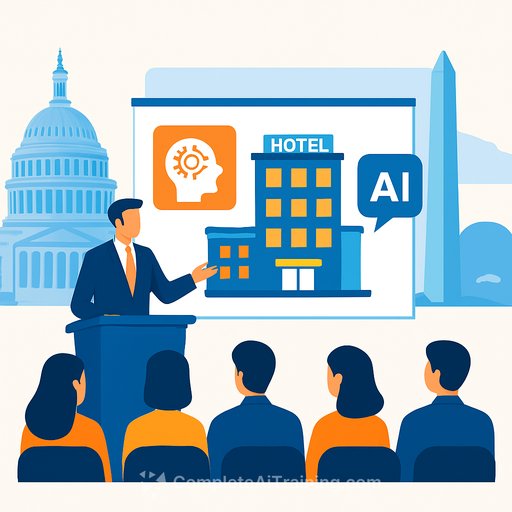How AI Is Helping Hospitality Companies in Madison Cut Costs and Improve Efficiency
Too Long; Didn't Read:
Madison hospitality is piloting AI to cut costs and boost efficiency: demand forecasting and smart scheduling can lower labor 5–15%, AI‑OCR combined with RPA trims invoice processing time by up to 70%, energy controls reduce utilities by around 23.5%, and robots plus scheduling improve staff efficiency by 25–40%.
Hospitality businesses in Madison are already using AI tools to reduce labor costs and waste without sacrificing personal service. Campus-driven demand forecasting and smart scheduling help prevent understaffing during University of Wisconsin–Madison events and reduce labor expenses by an estimated 5–15%. AI-powered check-in, chatbots, and predictive housekeeping cut routine workloads and speed up guest services.
For managers interested in upskilling their teams, there are focused training programs that teach practical AI skills, including prompt-writing and responsible workplace AI use. These skills help staff operate AI tools effectively while delivering measurable savings.
Front-Desk & Guest Services: Chatbots, Kiosks and Virtual Concierges
Madison hotels and short-term rentals reduce lobby congestion and speed up service by combining AI guest messaging, self-service kiosks, and virtual concierges. AI chatbots and messaging platforms like WhatsApp/SMS can automate about 30% of repetitive front-desk questions, enable mobile check-in, and provide digital keys.
Interactive kiosks ease lobby crowding and improve guest satisfaction in real time. 24/7 chatbots handle FAQs, booking changes, and targeted upsells that increase ancillary revenue. This frees staff to focus on VIP guests, events, and complex problem-solving. The result is lower staffing pressure during peak times, happier guests, and recaptured revenue that might otherwise be lost to long lines or missed upsell opportunities.
Operations & Back-Office: RPA, Finance Automation and Predictive Maintenance
Back-office automation combines robotic process automation (RPA) with AI to remove repetitive tasks from employees’ desks. Madison hotels automate invoice capture and approvals, reconcile commissions from online travel agencies, update rates in property management systems, and generate consolidated financial reports.
Finance teams see dramatic reductions in invoice cycle times—case studies show up to 70% time savings using AI-OCR combined with RPA. Bots also reduce errors in reconciliation by extracting data from emails and booking systems and posting directly into ERPs. Intelligent bots keep rate codes and promotional allocations updated across channels, preventing revenue leakage during high-demand UW–Madison events.
Revenue Management & Marketing: Dynamic Pricing and Personalization
Modern revenue management tools allow Madison hotels to react quickly to market changes like competitor pricing, booking velocity, and local events. These systems flag underpriced properties and suggest actionable pricing adjustments.
Pairing this with localized demand predictions based on campus events helps hotels maximize average daily rates and occupancy. This combination makes pricing more responsive and tailored, enhancing revenue without overburdening staff.
Energy, Waste and Sustainability: Smart Building Management
Madison properties cut costs and carbon emissions by using occupancy-aware controls, cloud AI analytics, and building sensors. Local research shows hotel green technology can reduce energy usage by 20–40%, with typical payback periods of 2–3 years.
AI-driven platforms learn how rooms respond to temperature changes and automate HVAC cycles and leak alerts. This maintains guest comfort while lowering energy consumption and costs.
Housekeeping, Food Service and Robotics: Automation on the Ground
Robots and smart scheduling are shifting routine tasks away from staff. Autonomous vacuums and scrubbers clean corridors and lobbies, saving about 40 minutes per floor daily. Delivery robots transport food, linens, and toiletries across hotels and campus facilities.
This automation frees housekeeping teams for higher-value tasks and can redeploy entire shifts to focus on guest experience.
Security, Privacy and Compliance Considerations in Wisconsin, US
Madison hospitality operators must treat AI and surveillance tools carefully to avoid legal risks. Wisconsin’s invasion-of-privacy statute prohibits installing surveillance devices in “private places” or recording nude/partially nude individuals without consent.
Wisconsin follows a one-party consent rule for some recordings, but this does not authorize covert monitoring where guests or employees expect privacy. Clear policies, signage, and documented consent are essential to stay compliant.
Platforms, Integrations and Vendor Options for Madison Companies
Choosing the right AI platform and integration partners is crucial. Modern hospitality ERPs centralize reservations, point-of-sale, customer profiles, and product models to eliminate manual reconciliation and enable faster, data-driven decisions.
Madison hotels benefit from selecting solutions that fit their operational scale and integrate smoothly with existing systems.
Practical Adoption Roadmap for Madison Hospitality Managers
- Start with targeted pilots combining campus-specific demand forecasting and staffing for a single UW–Madison event.
- Train a small group of operators on AI prompt use and vendor APIs.
- Require audit trails and documented business justifications before going live.
- Set clear KPIs to measure labor savings, guest satisfaction, and revenue impact.
Risks, Workforce Impact, and Ethical Use of AI in Wisconsin
AI adoption comes with legal, workforce, and security risks. Wisconsin’s laws prohibit hidden cameras or secret audio in guest rooms, so compliance through policies and transparency is mandatory.
While automation may reduce some entry-level roles, upskilling workers allows hotels to redeploy staff into guest relations, revenue management, or technical support roles.
Frequently Asked Questions
- How is AI currently helping hospitality companies in Madison cut costs and improve efficiency?
AI reduces labor, waste, and manual work across operations like guest services, finance, and housekeeping. - Which specific AI tools and vendor categories should Madison operators consider?
Evaluate tools by use case—such as chatbots, RPA, and dynamic pricing—and how well they integrate with existing systems. - What legal, privacy and security risks should Madison hospitality managers address when deploying AI?
Focus on Wisconsin’s invasion-of-privacy laws and emerging AI regulations. - How should Madison properties pilot and measure AI to ensure measurable savings and responsible adoption?
Use targeted pilots with clear KPIs and governance. - What workforce and training strategies can preserve jobs while capturing AI efficiency gains?
Combine automation with upskilling frontline and back-office staff in practical AI use.
If you’re interested in practical AI training tailored for hospitality and other workplaces, consider exploring courses at Complete AI Training to equip your team with skills that deliver real savings.
Your membership also unlocks:






